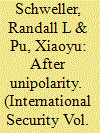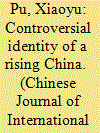|
|
|
Sort Order |
|
|
|
Items / Page
|
|
|
|
|
|
|
| Srl | Item |
| 1 |
ID:
105977


|
|
|
|
|
| Publication |
2011.
|
| Summary/Abstract |
The emerging transition from unipolarity to a more multipolar distribution of global power presents a unique and unappreciated problem that largely explains why, contrary to the expectations of balance of power theory, a counterbalancing reaction to U.S. primacy has not yet taken place. The problem is that, under unipolarity and only unipolarity, balancing is a revisionist, not a status quo, behavior: its purpose is to replace the existing unbalanced unipolar structure with a balance of power system. Thus, any state that seeks to restore a global balance of power will be labeled a revisionist aggressor. To overcome this ideational hurdle to balancing behavior, a rising power must delegitimize the unipole's global authority and order through discursive and cost-imposing practices of resistance that pave the way for the next phase of full-fledged balancing and global contestation. The type of international order that emerges on the other side of the transition out of unipolarity depends on whether the emerging powers assume the role of supporters, spoilers, or shirkers. As the most viable peer competitor to U.S. power, China will play an especially important role in determining the future shape of international politics. At this relatively early stage in its development, however, China does not yet have a fixed blueprint for a new world order. Instead, competing Chinese visions of order map on to various delegitimation strategies and scenarios about how the transition from unipolarity to a restored global balance of power will develop.
|
|
|
|
|
|
|
|
|
|
|
|
|
|
|
|
| 2 |
ID:
153838


|
|
|
|
|
| Summary/Abstract |
The parallel rise of India and China is one of the most significant strategic developments in the twenty-first century. While the West has enthusiastically welcomed the rise of India, it has been met with a more ambivalent response from China. India is sending complicated signals about its preferred status on the global stage. Struggling for recognition as a Great Power, India is also trying to maintain solidarity with developing countries. While Chinese elites mostly view it as a positive development, China's accommodation of India's rise has been partial, conditional and inconsistent. China's interpretations of India's signals largely depend on China's own identity, as well as political calculations. India's efforts to foster solidarity among developing countries resonate well with Chinese elites. The Chinese public has received Indian Prime Minister Narendra Modi's public diplomacy positively, and India's diplomatic activism has increased its profile in the eyes of China's policy elites. China is hesitating to accommodate some aspects of India's Great Power aspirations, but status politics is not always a zero–sum game. Chinese elites see improvement in the Sino-Indian relationship as a condition for China's greater acceptance of India's Great Power aspirations, and there is still some room for bargaining and mutual accommodation. While there is great potential for cooperation between India and China, distrust and suspicions continue to shape the trajectories of the relationship.
|
|
|
|
|
|
|
|
|
|
|
|
|
|
|
|
| 3 |
ID:
153025


|
|
|
|
|
| Summary/Abstract |
How a rising power adapts to its new status is an important challenge in international relations. Since the global financial crisis, Chinese scholars have hotly debated China’s international positioning. The ongoing debate reveals a high level of uncertainty about China’s position in the world. While the notion of the ‘revival of the Chinese nation’ implies the clear goal of ‘making China great again’, China’s ultimate place on the global stage is unclear. Many Chinese scholars might want China to become richer and stronger, but disagree on whether or not China should eventually seek superpower status. Regarding strategies, Chinese scholars also debate whether China should maintain a low profile or strive for greater achievements in global affairs. This article takes a ‘status signalling’ approach to explain why Chinese scholars take various positions in this debate. Status signalling aims either to change or maintain a special type of ‘status belief’ among relevant political actors. China must manage its conflicting roles in ways that advance its interests but do not engender dangerous misperceptions. In particular, China must balance the competing incentives between resolve and reassurance, status and responsibilities, and the domestic and international audience. These competing incentives have shaped the Chinese debate on international positioning.
|
|
|
|
|
|
|
|
|
|
|
|
|
|
|
|
| 4 |
ID:
161717


|
|
|
|
|
| Summary/Abstract |
In recent years, some Chinese elites have started to rethink the strategies and tactics of China's rise on the global stage. Some scholars see the problems in the West as strategic opportunities for China. However, others worry that Beijing might have taken steps too bold and too soon. This article aims to provide an updated analysis of the Chinese scholarly debate of strategic overstretch. Similar to the economics of cost–benefit analysis, strategic overstretch occurs if the cost of maintaining the existing system exceeds the benefits. Most Chinese scholars agree that China's policy community should pay more attention to the topic of strategic overstretch, while they disagree on the extent to which China already has such a problem. Designing and implementing a prudent grand strategy is an enduring challenge for Great Powers and Chinese scholars have taken different positions on the goals, means and time horizon of China's grand strategy. While we cannot claim that the Chinese scholarly debate has fundamentally changed China's foreign policy, there is a clear correlation between the emergence of a cautious voice in the academic world and the moderation of Chinese foreign policy—even as China continues to implement an ambitious foreign policy in a new era.
|
|
|
|
|
|
|
|
|
|
|
|
|
|
|
|
|
|
|
|
|